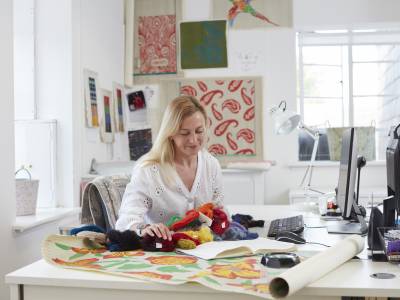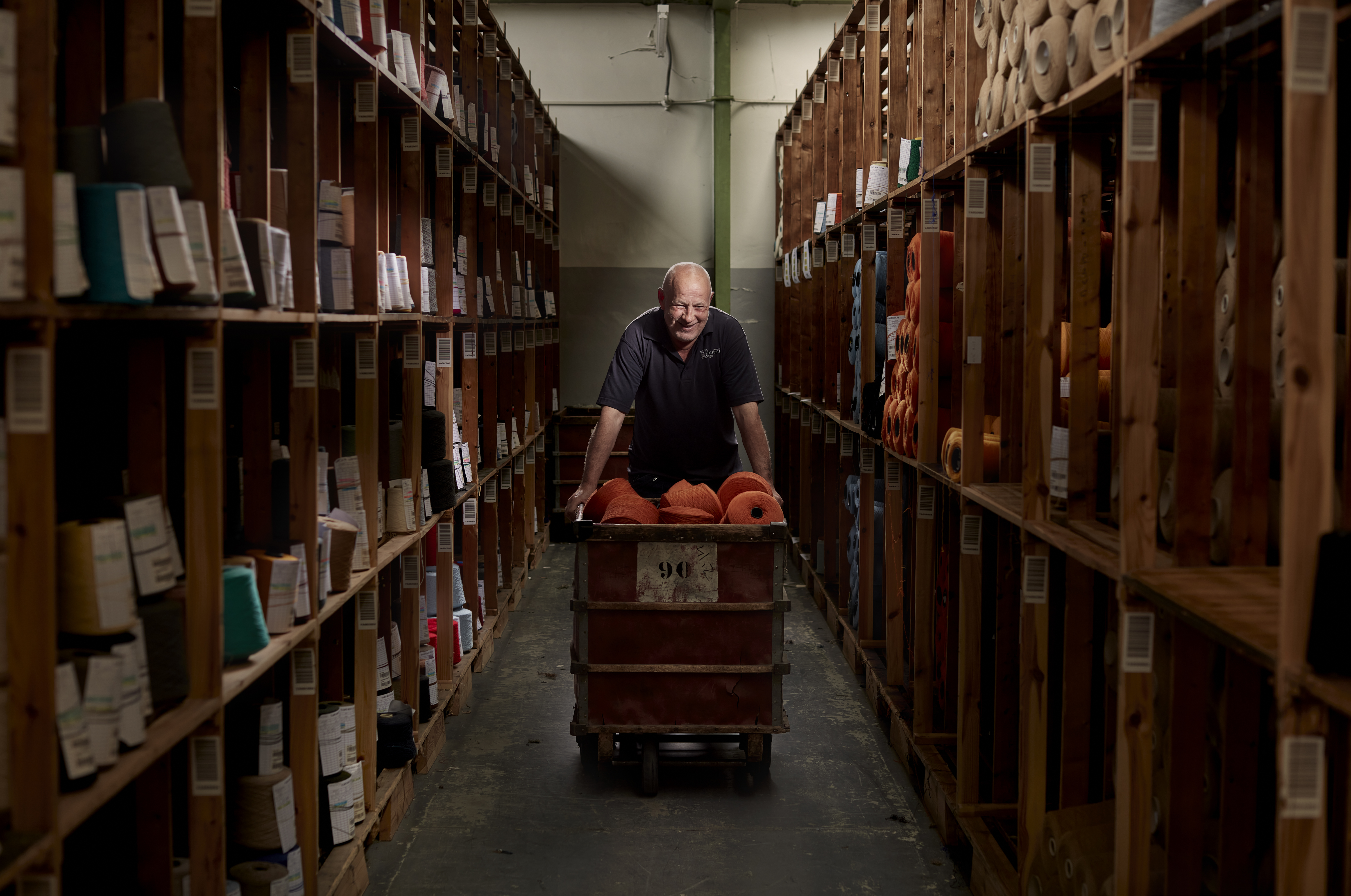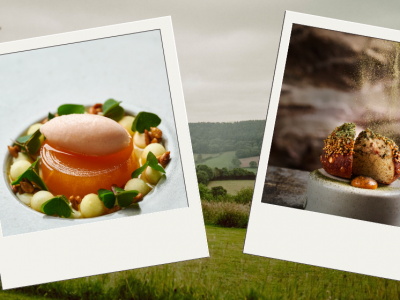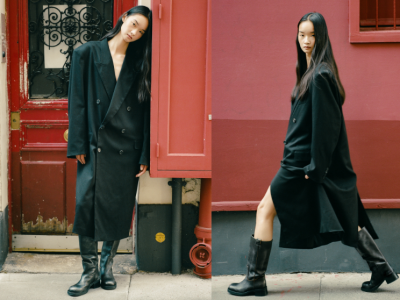While fashion mavens and luxury lovers the world over will recognise the Johnstons of Elgin name as synonymous with ultra-high-end cashmere and woollens, not everyone is aware of the true extent of influence that the heritage Scottish brand commands within the textiles industry.
Distinct from those luxury names that trade heavily on trend, image and logo, Johnstons lets its quality do the talking. Transforming natural fibres into swaths of beautifully made fabric — which, in turn, become everything from capes and coats to scarves, blankets and beyond — the company’s designs are meticulously crafted to last for years.
Johnstons works closely with the crème de la crème of top international brands. You’ll have undoubtedly witnessed its creations on the catwalks of the globe’s most prestigious designers. Then there are the company’s own in-house collections, consisting of a range of understated, exquisitely made styles for men, women, children and the home.
“We’re a brand that makes the products we sell — we’re makers and craftspeople in our own right,” says Chris Gaffney, Johnstons of Elgin’s CEO. He joined Johnstons’ board of directors in 2011, and was promoted from group finance officer to chief executive officer in November of last year. “That link is of great value because it has realism and authenticity,” he adds, “especially now, when many people are looking for genuine ‘slow luxury’ brands with honest integrity.”
The company has a long and venerable history that began in 1797, when Alexander Johnston founded the Elgin Mill on the banks of the River Lossie in northeast Scotland. An ambitious entrepreneur who dabbled in goods as diverse as tobacco, hats and even herring, it was his eponymous brand that would go on to cement a legacy in finely crafted fabrics.
Tight Knit Team: The Story Behind Johnstons of Elgin
29th September 2022
Beautifully crafted cashmere and woollens, deeply rooted in sustainable heritage, are the cornerstone of Johnstons of Elgin

Johnstons of Elgin celebrates its 225th anniversary in 2022. The company remains family owned; but Alexander Johnston’s mill has evolved into a state-of-the-art manufacturing centre, where all of the company’s wovens are made, while knitwear is produced further south at a second location in Hawick, close to the Scottish Borders. Each and every product is proudly labelled Made in Scotland.
“Over the years, Johnstons of Elgin held on to its founding ethos and stayed close to its artisans, rather than outsourcing — even in the 1990s and 2000s, when many other brands were going offshore to China, the owners continued to manufacture here in the UK,” says Gaffney. A canny move: now, in a time when most companies are looking to shorten supply chains and champion local craft, Johnstons is well ahead of the curve. The same can also be said for its sustainable practices. While ‘sustainability’ is often a questionable term that suggests greenwashing and virtue signalling within the fashion industry, at Johnstons of Elgin, its true meaning has been rooted deep for decades.
“There are certain gifts that our predecessors have given us,” explains Gaffney. “First and foremost, we use natural fibres from a natural system. Because of our heritage and skill, we make timeless, durable products that will live for a long time in people’s wardrobes. This reflects the current ethos of buying less while also buying better. Our products are the best in their class.”
The brand’s Scottish location is another boon. Alongside their close proximity to some of Europe’s largest wind farms, the mills have access to an abundance of fresh river water. Once used, water is thoroughly cleaned in a nearby processing plant before being released, ensuring the local environment stays protected. “Of course, there are things we still have to work on — improving our carbon footprint, for example, and using less plastic,” says Gaffney. “We’ve recently worked with a sustainability specialist and are aiming towards B Corp accreditation. We’ve also partnered with Cashmere Circle, a conscious company that extends the life of cashmere with specialist aftercare.”
As a family business based within two small towns, social sustainability is integral to Johnstons of Elgin’s modus operandi. Gaffney illustrates how the company strives to employ locally and to create a sense of community within the mills themselves. (Gaffney himself was born in Hawick and grew up in Elgin, so he has personal ties to both Johnstons communities.) Each mill employs a wide variety of ages — it’s not unusual to see family members spanning different generations working side by side, and many a friendship or a love story has sprung up on the factory floor. Some craftspeople have worked for Johnstons for as long as 40 years.

“We offer training apprenticeships in all sorts of things, be it weaving, knitting or finishing,” says Gaffney. “There are about 300 different job descriptions in our business. It’s our responsibility, as custodians of those skills, to pass them down from one generation to the next.” Keeping a close eye on its supply chain, the company uses the very best raw fibres sourced from longstanding international partners. Merino wool is produced in Australia, while cashmere comes from either China, for the finer, whiter Alashan variety, or from Mongolia for darker fibres. Johnstons representatives make frequent trips abroad to ensure standards related to fair trading and animal welfare are upheld, working alongside dedicated organisations such as the Sustainable Fibre Alliance to educate herders and encourage environmentally friendly practices.
This is just the first step in the company’s vertically integrated business model. Once the fibres are in Scotland, every consequent manufacturing process takes place within the mills. Fibres are crafted into yarns, which can then be dyed, woven, darned and finished, with exacting quality controls conducted at every stage. “If you go into our store on New Bond Street, everything in that store will have been made in our mills,” says Gaffney. “That’s pretty unique.”
Innovation is a two-fold operation. As a fashion house, creativity is key. “About 50% of products made each year are new,” Gaffney explains. “Sometimes we’ll work with brands that have a very clear idea of what they want, while others come to us with just a single word for our designers to work from. Within our own brand, we’ve got huge creative credence to try different things, exploring innovation in texture, design, weights, materials, aesthetics, colour...”
There are other innovations in process too, whether that’s working with cutting-edge textile companies to harness new design tools, researching new materials at trade fairs, or collaborating with Johnstons’ own craftspeople at the mills to improve day-to-day work practices. Though the brand celebrates 225 years of history this year, the Johnstons team is still keeping its gaze firmly on the horizon. Anniversary celebrations include high-profile collaborations such as a capsule fabric and throw collection made in partnership with architect and interior designer Ben Pentreath. Playful and bold, its designs make a modern statement in distinctive stripe, check or houndstooth patterns.
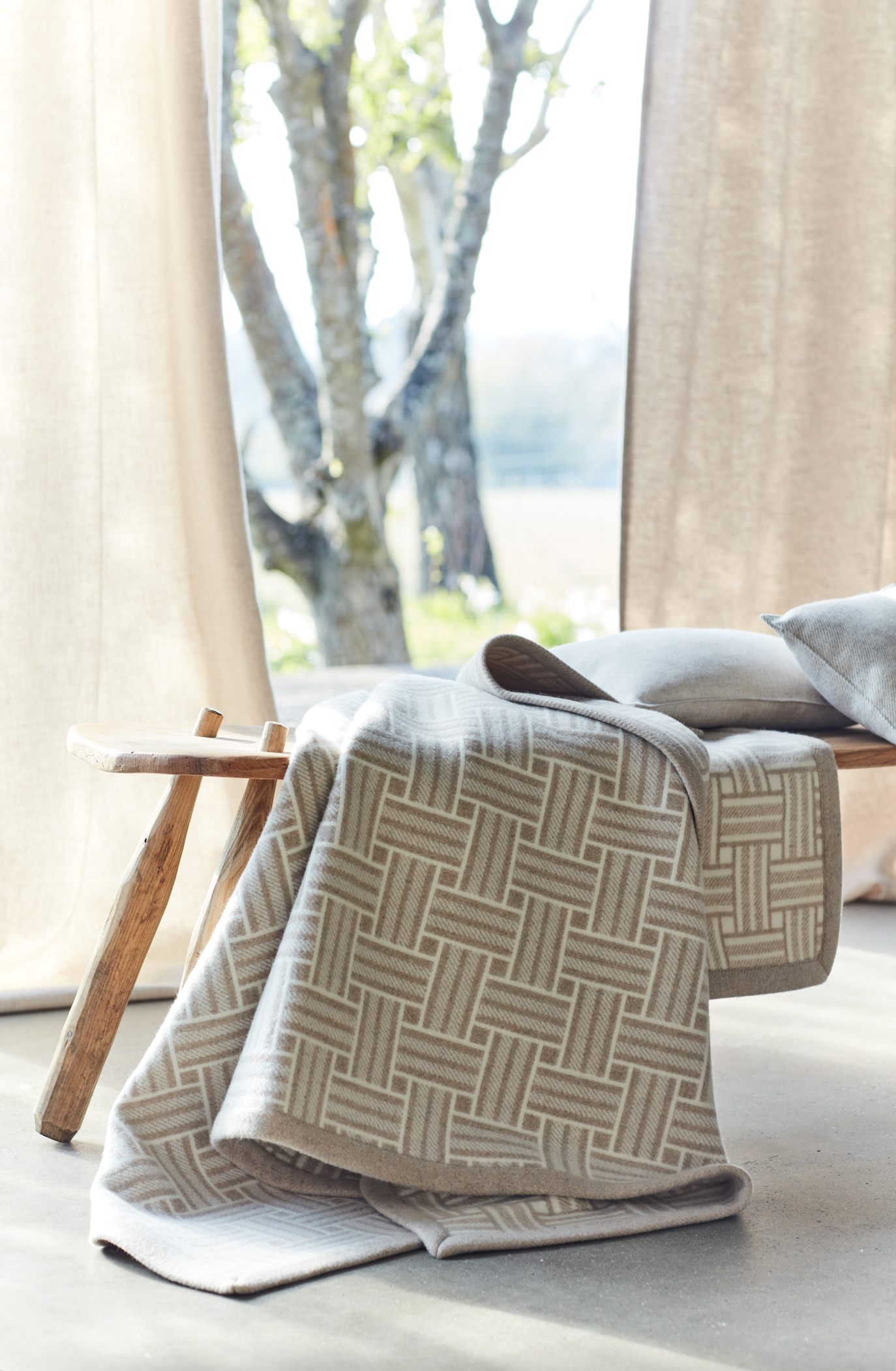
That said, Johnstons of Elgins’ two-plus centuries of heritage remain a point of considerable pride. A recent launch with Sabina Savage saw the London-based print designer mine the brand’s extensive archives to produce a historically themed scarf, available in three different weights. Inspired by the Great Exhibition of 1851 — at which the brand exhibited — the collection consists of hand-drawn tapestry stoles crafted in silk, each a tribute to the weaving methods championed by the company. This season’s accessories are influenced by tweed, a nod to the first fabrics of their kind produced by the company in 1846. Tweed scooped Johnstons of Elgin its coveted royal warrant in 2013, awarded by HRH Prince Charles — the Duke of Rothesay, as he is known in Scotland — in recognition for its historic association with the material.
“We actually wove a Super Balmoral Tweed back in 1853, shortly after Queen Victoria bought the castle,” says Gaffney. “This was when the very first tweeds were being created. While tartans were used to identify families, tweeds were created for estates. When people would go to an estate, they would wear its tweed. We still make tweeds for local estates, taking coats and jackets from our archive and making them contemporary.” Johnstons of Elgin’s autumn/winter 2022 Full Circle collection draws fresh design concepts from its long-established textile traditions. Gaffney describes the pieces as “beautiful products that showcase the natural beauty of our fibres in timeless colours and constructions.”
He highlights a chunky float stitch sweater, describing how the fabric’s autumnal tones complement its complex stitch, enhancing the garment’s luxe appeal. And what does he foresee for historic brand Johnstons of Elgin’s future within the world of luxury? After some thought, he replies, “Appealing to the 21st-century consumer is about the details, the small things that truly elevate a piece. A lot of that comes back to the fabric. We’re interested in keeping up to date — not with today’s fashions, but with modern styling and the contemporary way of life, so that products remain relevant. We’ve got the fantastic opportunity to develop Johnstons of Elgin so that it is seen as the luxury brand of Scotland.” johnstonsofelgin.com
